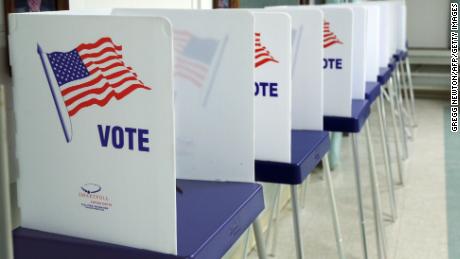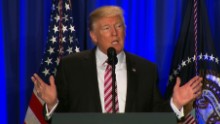Trump dissolves voter fraud commission; adviser says it went 'off the rails'
Washington (CNN)President Donald Trump dissolved his much-touted voter fraud commission on Wednesday, attributing the step to various states' refusal to participate in the board, which was criticized as a misguided step to solve a practically non-existent problem.
In the wake of the announcement, advisers outlined hesitation from within the White House for months about the commission.
"It's a s--t show," said one White House adviser to CNN, adding that the commission went "off the rails."
Trump established the commission in May after claiming without evidence that massive voter fraud had cost him the popular vote, and he appointed Vice President Mike Pence and Kansas Secretary of State Kris Kobach to lead the panel.
But after months went by and the commission faced pushback from officials across the country, civil rights advocates and even a member of the commission itself -- as well as an unclear mandate, according to the White House official -- Trump pulled the plug Wednesday.
The White House said in a statement: "Despite substantial evidence of voter fraud, many states have refused to provide the Presidential Advisory Commission on Election Integrity with basic information relevant to its inquiry. Rather than engage in endless legal battles at taxpayer expense, today (President Donald Trump) signed an executive order to dissolve the Commission, and he has asked the Department of Homeland Security to review its initial findings and determine next courses of action."
Another White House official familiar with the matter said the commission was unable to operate as structured under the Federal Advisory Committee Act. That law mandates a degree of transparency around commission activities and was the subject of litigation against it.
The official also suggested the Department of Homeland Security could take up the issue.
A controversial task from the start
The commission has been beset by controversy virtually since it began.
Critics contended Trump was simply finding a way to account for his popular vote loss in the 2016 presidential election, and one White House adviser expressed a belief that Trump simply wanted the commission to deliver a report saying voter fraud is a problem and to offer some directives to address it.
Another senior White House official acknowledged bringing on Kobach was controversial.
"He's a lightning rod," the official said.
A source close to Pence said chairing the commission "wasn't something that (Pence) asked for," but that the vice president has a "workman-like attitude" about these things, and so he took on the job.
The source said Trump wanted Kobach involved in the commission with the understanding that while Pence would share the chairing role with Kobach, it would be Kobach who would run the commission day-to-day.
Treat 'it like a book report'
The panel requested wide-reaching information about voters in every state, including dates of birth and partial Social Security numbers. The request was met with swift and strong opposition by many state election officials, setting off a series of lawsuits over privacy, and requests were eventually scaled back.
There was even concern among some in the White House that some of the requests from the commission, including asking for voter rolls, crossed legal boundaries and might not have been that well thought out before they were announced publicly.
The senior adviser lamented how far down the road the White House and Vice President's office had gotten with the commission.
"VP's team, though, should have seen that assignment as a s--t sandwich and treated it like a book report," the adviser said. "Avoid trouble, cite real instances of voter fraud, address structural and technology problems, make recommendations and move on."
A spokeswoman for Pence's office referred inquiries about the commission's dissolution to the White House statement.
RELATED: Trump election commission head lambasted for voter fraud claims

Fact-checking Trump's claims on voter fraud
Statements stoking outrage
Shortly after his shocking win in the 2016 presidential election, Trump asserted via Twitter, without evidence, that he would have won the popular vote had millions not voted illegally.
"In addition to winning the Electoral College in a landslide, I won the popular vote if you deduct the millions of people who voted illegally," he said.
News Courtesy: www.cnn.com











